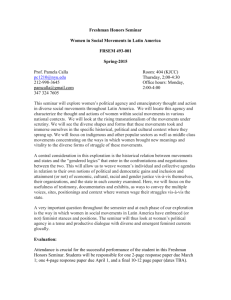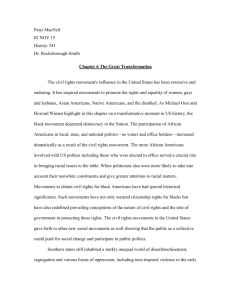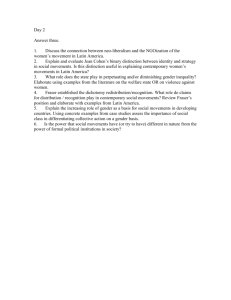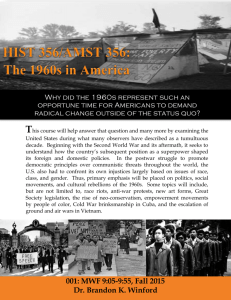Freshman Honors Seminar
advertisement
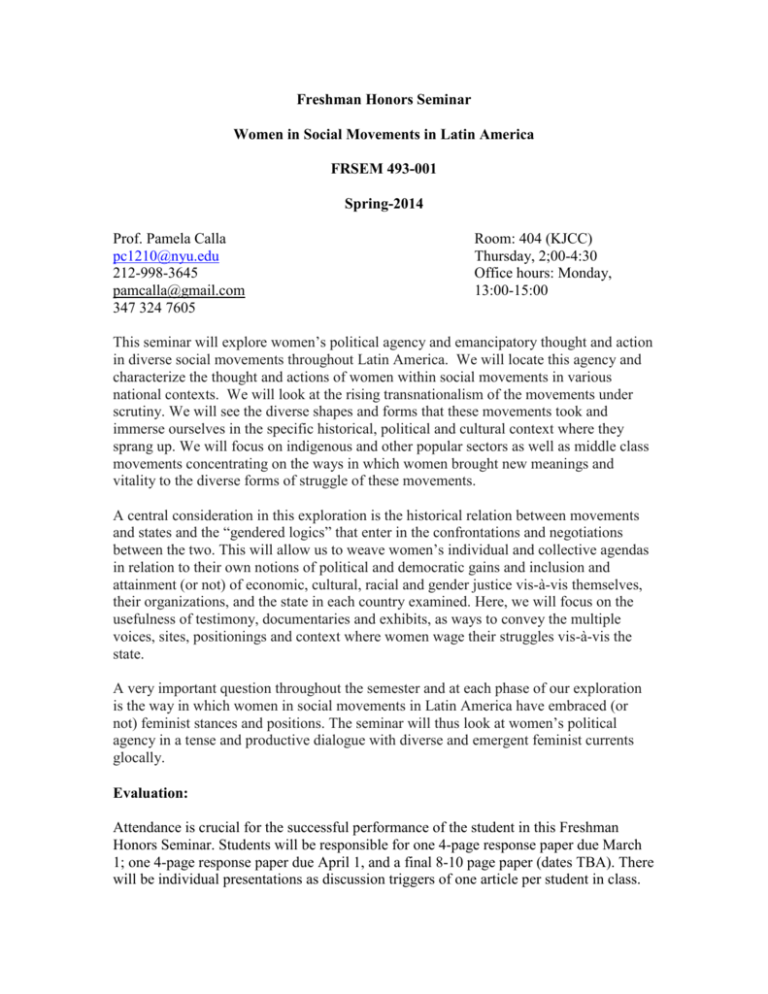
Freshman Honors Seminar Women in Social Movements in Latin America FRSEM 493-001 Spring-2014 Prof. Pamela Calla pc1210@nyu.edu 212-998-3645 pamcalla@gmail.com 347 324 7605 Room: 404 (KJCC) Thursday, 2;00-4:30 Office hours: Monday, 13:00-15:00 This seminar will explore women’s political agency and emancipatory thought and action in diverse social movements throughout Latin America. We will locate this agency and characterize the thought and actions of women within social movements in various national contexts. We will look at the rising transnationalism of the movements under scrutiny. We will see the diverse shapes and forms that these movements took and immerse ourselves in the specific historical, political and cultural context where they sprang up. We will focus on indigenous and other popular sectors as well as middle class movements concentrating on the ways in which women brought new meanings and vitality to the diverse forms of struggle of these movements. A central consideration in this exploration is the historical relation between movements and states and the “gendered logics” that enter in the confrontations and negotiations between the two. This will allow us to weave women’s individual and collective agendas in relation to their own notions of political and democratic gains and inclusion and attainment (or not) of economic, cultural, racial and gender justice vis-à-vis themselves, their organizations, and the state in each country examined. Here, we will focus on the usefulness of testimony, documentaries and exhibits, as ways to convey the multiple voices, sites, positionings and context where women wage their struggles vis-à-vis the state. A very important question throughout the semester and at each phase of our exploration is the way in which women in social movements in Latin America have embraced (or not) feminist stances and positions. The seminar will thus look at women’s political agency in a tense and productive dialogue with diverse and emergent feminist currents glocally. Evaluation: Attendance is crucial for the successful performance of the student in this Freshman Honors Seminar. Students will be responsible for one 4-page response paper due March 1; one 4-page response paper due April 1, and a final 8-10 page paper (dates TBA). There will be individual presentations as discussion triggers of one article per student in class. Students will meet with the professor prior to their presentations. Group work is also important, for this, students will organize in groups and collaborate in aspects pertaining the theme of the course “women in social movements” in the organization of the exhibit “Stories of El Salvador: The Civil War and Its Aftermath,” April 1-May 2, 2014. A 2 page write up of the experience of collaboration will be expected from each student. 15 % for attendance and participation 10 % for short presentation in class (TBA) 15 % for 4 page response paper (March 1) 15 % for 4 page response paper (April 1) 10 % for collaborative project participation and write up (April 29) 35 % for final paper (May 15) Books to be purchased: Domitila Chungara, Let Me Speak!: Testimony of Domitila, a Woman of the Bolivian Mines. Moema Viezzer (Author), Victoria Ortiz (Translator) Rigoberta Menchu, I, Rigoberta Menchu: An Indian Woman in Guatemala Elisabeth Burgos-Debray (Editor), Ann Wright (Translator) Invited Speakers: Nieves Aires (Chile-Bronx) Temma Kaplan (Rutgers University) Lynn Stephen (University of Oregon) Videos Colombia: We Women Warriors Chile: Memoria Obstinada Bolivia: Las hermanas de las Bartolina Sisa Peru: A Woman’s womb http://www.cultureunplugged.com/play/4623/A-Woman-s-Womb Bolivia: “Even the Rain” Exhibit: Stories of El Salvador: The Civil War and Its Aftermath, April 1-May 2, 2014 Week 1, Jan. 30: Introduction Week 2, Feb. 6: 1) Writing Workshop// 2)Women in Social Movements: Framing the discussion 1) Writing workshop (45’) 2) Second part of class Greg Grandin, “Introduction” In Empire’s Workshop. Stephen, Lynn. 2013. Chapter 1: Testimony, Human Rights and Social Movements. In We are the Face of Oaxaca: Testimony and Social Movements. Duke University Press Nancy Fraser (2009) "Mapping the Feminist Imagination: From Redistribution to Recognition to Representation" In Scales of Justice. Reimagining Political Space in a Globalized World. Week 3, Feb. 13: From Democratic Socialism to Dictatorship: Women’s Struggles in Chile throughout 1970’s Temma Kaplan. 2004. Prologue, Chapter 2 and 3. Taking Back the Streets: Women, Youth, and Direct Democracy (online Bobst) Invited speakers: “Sharing visions”, Nieves Aires and Temma Kaplan Movie: “La Memoria Obstinada” Patricio Guzman Week 4, Feb. 20: From Dictatorship to Democracy: “Wives” and the Politics of Difference and Equality in Bolivia throughout the 70’s Domitila Chungara, Let Me Speak!: Testimony of Domitila, a Woman of the Bolivian Mines. Moema Viezzer (Author), Victoria Ortiz (Translator) You tube about Domitila Chungara Movie: Las Hermanas de las Bartolinas Complementary: June Nash. 1984. Chapter 5. We eat the mines and the mines eat us. Book and video: Maria Lagos, Introduction, Chapters 1, 2 and 11. In Al Rojo Vivo y a Puro Golpe Week 5, Feb 27: What the Madres de la Plaza de Mayo started in Argentina: A generational struggle Temma Kaplan, Making Spectacles of themselves in Argentina. Chapters 4 and 5. Taking Back the Streets Diane Taylor. HIJOS. In The Archive and the Repertoire: Performing Cultural Memory in the Americas. Durham: Duke University Press You tube: Scratches Week 6, March 6: Peer editing review workshop//Armed Struggles and the Gender of Revolutions: Central America and Cuba Margareth Randall, 1992. Chapter 1 Gathering Rage: The failure of Twentieth Century Revolutions to Develop a Feminist Agenda. New York: Monthly Review Press Karen Kampwirth. 2004. Introduction and Chapter 5. Feminism and the Legacy of Revolution: Nicaragua, El Salvador, Chiapas Karen Kampwirth. 2005. Chapter 4 Cuba. In Women and Guerilla Movements : Nicaragua, El Salvador, Chiapas, Cuba Complementary: Jocelyn Olcott, 2006. “The Center Cannot Hold. Women on Mexico’s Popular Front” In Sex in Revolution: Gender, Politics and Power in Modern Mexico, Duke University Press Week 7, March 14: Preparing for the exhibit: El Salvador Stephen, Lynn. 1997. Interview: Morena Herrera, Women for Dignity and Life. In Women and Social Movements in Latin America: Power from Below Karen Kampwirth. 2004. Chapter 3. Feminism and the Legacy of Revolution: Nicaragua, El Salvador, Chiapas Invited speakers and organizers of activities with students: Jose Raul Guzman and Camilla Querin, curators of the exhibit “Stories of El Salvador: The Civil War and Its Aftermath,” April 1-May 2, 2014 (Digital catalogue, Framing, Installation) SPRING RECESS Week 8, March 27: The politics of difference and equality in the 1980’s Central America’s Wars Movie: When the Mountains Tremble Rigoberta Menchu, I, Rigoberta Menchu: An Indian Woman in Guatemala Elisabeth Burgos-Debray (Editor), Ann Wright (Translator) Week 9: April 4: The appropiation of global human rights discourse Movie: Granito Victoria Sanford, From I, Rigoberta to the Commissioning of Truth: Maya Women and the Reshaping of Guatemalan History. Cultural Critique - 47, Winter 2001, pp. 16-53 Daniel Hernandez, Angel’s of Memory, Guatemala Exhibit. http://lens.blogs.nytimes.com/2012/06/04/angels-watch-over-memories-of-war/?_r=0 You tube: Trial of Rios Montt https://www.google.com/#q=trial+of+rios+montt++youtube Week 10: April 10: Beijing, neoliberalism and reproductive and sexual Politics Jocelyn Olcott. “Cold War Conflicts and Cheap Cabaret. Sexual Politics at the 1975 United Nations International Women’s Year Conference” Paper presented at The NYHWG Movie: A Woman’s womb http://www.cultureunplugged.com/play/4623/A-Woman-s-Womb Margarita Huayua, Ethnic cleansing in Peru: "Family planning" under Fujimori Manuscript (Draft). Week 11, April 17: Women as part of anti-neoliberal movements Sonia Alvarez, ""Latin American Feminists Go Global" in Cultures of Politics/Politics of Cultures, pp 293-324. Stephen, Lynn. 2013. Chapter 6. In We are the Face of Oaxaca: Testimony and Social Movements. Duke University Press Website: Media and Gender. We are the Face of Oaxaca: Testimony and Social Movements Brazil: Women in the Movimiento Sin Tierra Complementary: Ochy Curiel “La Crítica Postcolonial desde las Prácticas Políticas del Feminismo Antiracista” Week 12, April 24: Indigeneity, Feminisms and Intercultural Paradigms in tension Aida Hernandez “Between feminist ethnocentricity and ethnic essentialism: the Zapatista’s demands and the National Women’s Movement” Gender and Cultural Politics in Chiapas University of Texas Press 2006 Speed, Shannon Hernandez Castillo, Aida Stephen, Lynne (Eds.) Manuela Picq “Identity Politics in Ecuador: Trapped between Gender and Ethnicity” Julieta Paredes. 2010. Hilando Fino. Translated by Margareth Cerrullo Complementary: Franco, Jean. (2010) “Moving from Subalternity: Indigenous Women from Guatemala and Mexico” In Reflections on the History of an Idea. Can the Subaltern Speak? R. Morris Ed. Week 13, May 2: Resources, territoriality and extraction: Gender/Race considerations Movie: Even the Rain Elizabeth Peredo Beltran with Carmen Peredo and Virginia Amurrio of “executive summary” In The Cochabamba Federation of Irrigators, Water, Privatization and Conflict: Women from the Cochabamba Valley (Heinrich Boll Foundation, 2004) http://www.boell.de/sites/default/files/assets/boell.de/images/download_de/internationale politik/gip4.pdf Nina Laurie, Gender Water Networks: Femininity and Masculinity in Water Politics in Bolivia. International Journal of Urban and Regional Research, Volume 35, Issue 1, pages 172-188, January 2011. Complementary: Nina Laurie, Establishing Development Orthodoxy: Negotiating Masculinities in the Water Sector. Development and Change, Volume 36, Issue 3, Pages 527-549, May 2005 Sharlene Mollett, (2010) “Esta listo? (Are you ready?) Gender, race and land registration in Rio Platano Biosphere Reserve”. Gender, Place and Culture, 17: 3, 357-375 Week 14, May 8: Constitutional Reforms, Interlegality and gender: Territory, state and/or communal justice Rachel Sieder and Teresa Sierra. 2010. Indigenous Women’s Access to Justice in Latin America. CMI Working Paper. Stephanie Russeau. “Indigenous and Feminist Movements at the Constituent Assembly in Bolivia” Latin America Research Review Vol 46, No 2, 2011 LASA Writing Tutor: (TBA) Free peer tutoring and academic coaching, one-to-one sessions, group reviews, workshops, and more!! University Learning Center www.nyu.edu/ulc ULC@Academic Resource Center, 18 Washington Place, Lower Level ULC@UHall, 110 East 14th Street, top of stairs by UHall Commons
